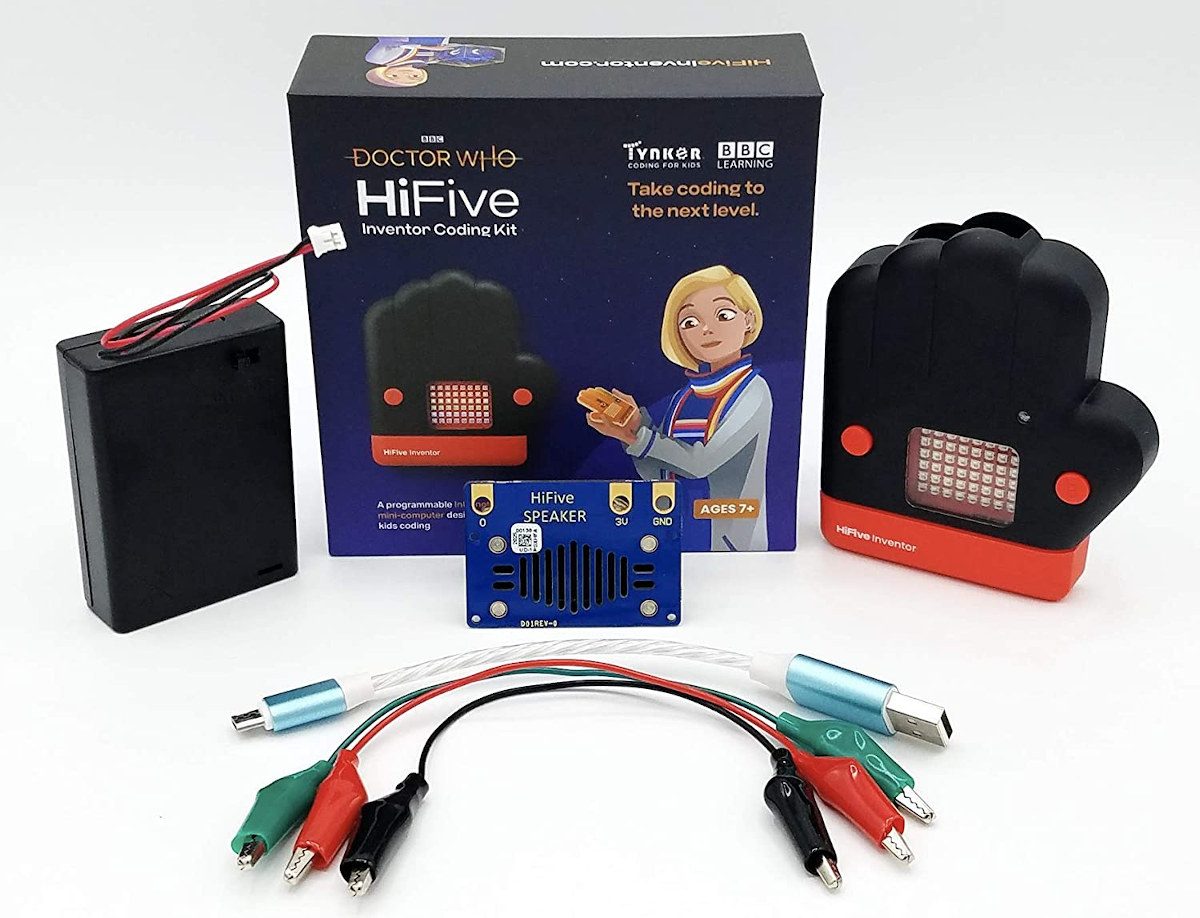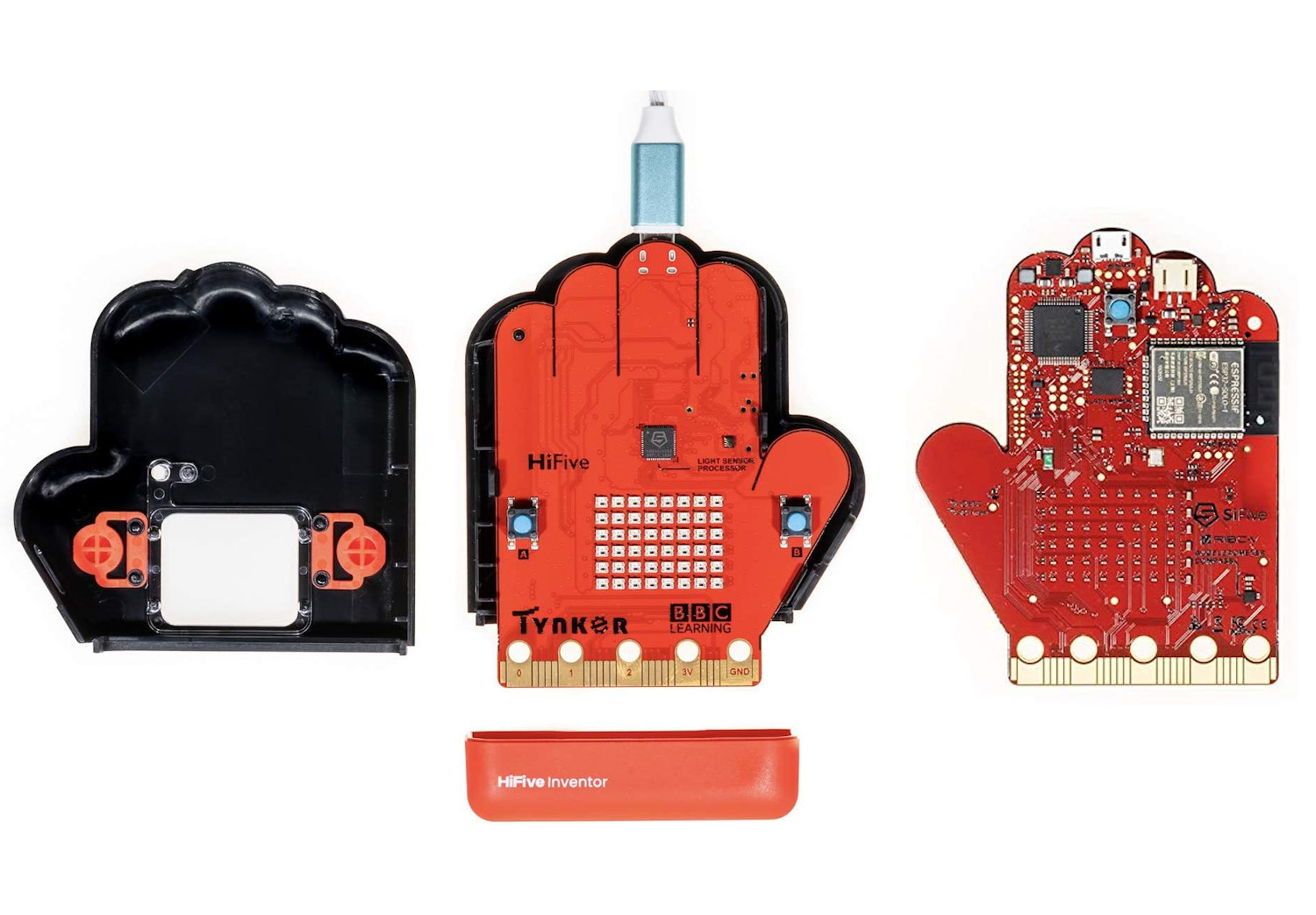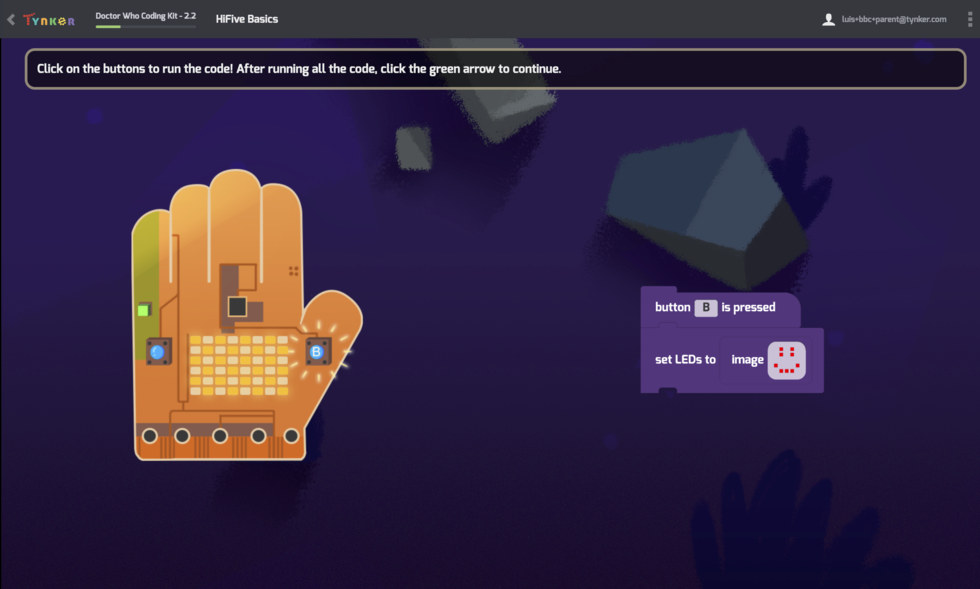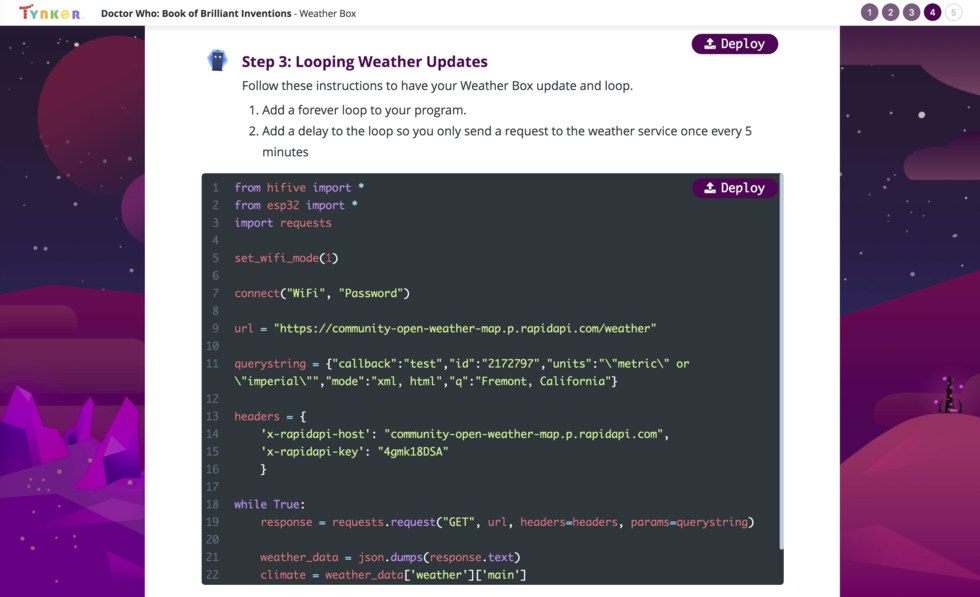In what should be one of the first RISC-V education platforms, the BBC, Tynker, and SiFive have just announced the BBC Doctor Who “HiFive Inventor” Coding Kit that comes with an MCU board with WiFi & Bluetooth and guided lessons for kids that teach them to code for the IoT.
The HiFive Inventor board is based on a SiFive FE310 RISC-V microcontroller ( the same chip as found in the HiFive1 board) and an ESP32 Solo module for WiFi 4 and Bluetooth 4.x/5.x connectivity. Just like the BBC Micro:bit, HiFive Inventor provides a kids-friendly edge connector with I/O, an LED matrix, sensors, and more.

The kit includes the HiFive Inventor hardware platform, a battery holder for three AA batteries (not included), the HiFive Speakers, an illuminated USB cable for power and programming, and alligator clips to connect the speaker or other add-ons to the HiFive Inventor board.
HiFive Inventor board looks to be based on the earlier SiFive Learn Inventor, with some variation such as the use of a single-core ESP32 module, and should offer the following hardware specifications:
- SoC – SiFive FE310-G003 32-bit RISC-V (RV32IMAFC) processor @ 150 MHz with 64KB of internal SRAM
- Storage – 512 KB flash
- “Display” – 8×6 array of RGB LEDs
- Connectivity – 2.4 GHz 802.11b/g/n WiFi 4 and Bluetooth 4.x/5.x via ESP32-SOLO-1 module featuring Espressif ESP32-S0WD single-core Xtensa LX6 processor, and 4MB SPI flash
- USB – 1x Micro USB port for power and programming/debugging
- Expansion
- A/D Converters (four) accessed via onboard coprocessor
- BBC Micro:bit compatible edge connector with I2C, SPI, UART, GPIO, 3.3V, and GND signals
- Sensors – eCompass module with 3-axis acceleration and magnetometer, ambient light sensor, thermometer accurate to 1°C over -40° to +85°C range
- Misc – Real-Time Clock, two user push-buttons, hard reset button
- Power Supply
- 5V via micro USB port
- Battery operation via 3x AA batteries (recommended)
 The kit is designed for children aged 7+ years or older, but lessons are said to be for all ages and include both block coding for early learners (aka Visual Programming)…
The kit is designed for children aged 7+ years or older, but lessons are said to be for all ages and include both block coding for early learners (aka Visual Programming)…
and Python (MicroPython) programming for advanced learners.
The lessons follow stories set in the world of Doctor Who for game-based learning. This step-by-step approach reminds me a little bit of my experience with the CrowdPi2 Raspberry Pi 4 laptop designed for STEM education, and it should certainly be an entertaining way of learning to code for IoT projects.
BBC Doctor Who “HiFive Inventor” Coding Kit is up for pre-order on Amazon for $74.95 with the official release scheduled for November 23rd. Additional information, including a Getting Started Guide, can be found on the official website.

Jean-Luc started CNX Software in 2010 as a part-time endeavor, before quitting his job as a software engineering manager, and starting to write daily news, and reviews full time later in 2011.
Support CNX Software! Donate via cryptocurrencies, become a Patron on Patreon, or purchase goods on Amazon or Aliexpress. We also use affiliate links in articles to earn commissions if you make a purchase after clicking on those links.







What’s more interesting than this kit is 3rd revision of FE310 microcontroller itself: in exchange for more than half of its clock (from 320 down to 150MHz) it got double the amount of SRAM and floating-point hardware (sadly no internal flash yet). Since core used in this microcontroller is ~1.29x faster than M4 (at least in DMIPS and CoreMarks), this drop in clock speed is not necesarily bad, given that now this chip is so much better in other areas. I can’t wait for LoFive or similarly simple board to have a wide release featuring this improved microcontroller, as well as for more projects to use it.
Wondering how dr. Who can be tied into science education of 7+ Y kids…
I have beggin eletronics when I was 7yo. 41 years later, I am still one of the best. If we give such kind of tools for a lot of childrens, for sure it will create a lot of future stars in electronics.
Not talking about this board, but it’s connection to the TV series.
this board will for sure create masses of future “makers”
Maybe kids who watch Dr. Who, and had no interest in coding may suddenly be interested?
If they are interested it will be for a whole 5 minutes. Kids have tablets, nintendo switches etc from the day they are born now so some blinky LEDs aren’t all that interesting anymore.
For me a crystal radio kit with probably 10 components in total was enough.
Kids watching dr who must be mental patients… Not that I’m not occasionally watching it, but I’d guess kids are not the primary target audience for that programme. Neither is it that much science based… Never mind, the product seems ok though.
Isn’t it a bit weird to add a RISC-V processor and then have an ESP-32 just for communication? For the kind of projects “7 year old children” typically the ESP-32 is by far more than enough powerful. The ecosystem, available libraries is probably much better than for RISC anyway. Not sure if this makes so much sense.
I don’t see much future in tensilica uCs, ARM and soon also RISCV will be standard for quite a while.
I wouldn’t be surprised if soon an esp64 would be released with a RISCV core or 2.
ESP32-C3 RISC-V processor has been unveiled: https://www.cnx-software.com/2020/11/22/esp32-c3-wifi-ble-risc-v-processor-is-pin-to-pin-compatible-with-esp8266/
Just saw the news, thanks!